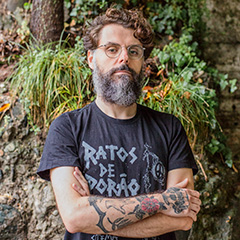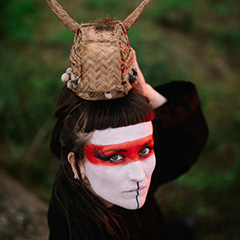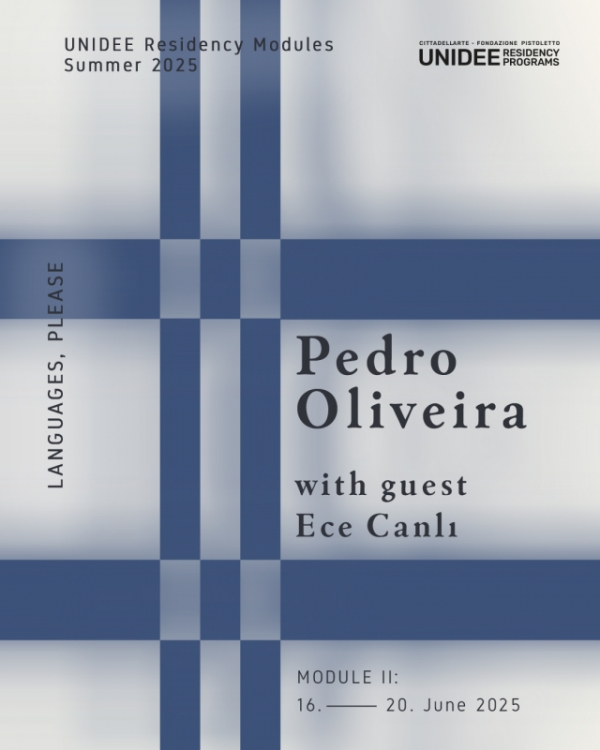UNIDEE Residency Modules: LANGUAGES, PLEASE / Module II
UNIDEE Residency Programs and Fondazione Pistoletto Cittadellarte are pleased to announce the open call for applications for the first two residency modules in the programme Languages, Please, curated by UNIDEE Visiting Curators Nina Fiocco and Gaia Martino.
The Module II, Summer 2025, Unknowing Listening / Transfluent Aurality will take place from 16 to 20 June, and it is led by mentor Pedro Oliveira and guest Ece Canlı.
Languages, Please, is an invitation to a collective series of rehearsals that explores languages as geopolitical spaces of dispute, narratives, and encounters. It is a call to engage with the porosity of our bodies in action and the narratives that can infuse and strengthen our practice of remaining polyphonic, amid the crumbling circumstances of the present. To learn more about the project's context and objectives, please refer to the complete curatorial framework here.
ABOUT MODULE II
This week-long workshop explores listening and aural practices at the limits of what knowledge is and can be. In a continuous process of doing and undoing—what we know, what we think we know, and what we might not know—we will engage in a transdisciplinary exercise of thinking with and through listening as a mode of redefining what it means to "know" something, to "understand" the world, and to act in the world. Our main goal is to rehearse modes and practices that engage with other-than-human worlds in non-extractive and non-utilitarian ways—practices that give as much as they take, and that engage without the precondition of making things transparent and legible. It brushes against the idea that the world is something external to ourselves, and thus can be properly organized in a system of understanding that is fixed, nameable, classifiable; capable of having its resources extracted, packaged, and commodified. With that, we will discuss together the failed promises of utilitarianism and extractivism, and engage in the radical exercise of imagining other possible worlds through poetic, artistic, activist, and scholarly work.
Our week together will be based on a range of different activities, from reading groups and collective discussion of texts—largely based on radical and counter-colonial knowledge—to listening, walking, recording and annotating, storytelling, etc. Listening will be our "red thread" in this work, and will be not taken for granted but constantly re-evaluated, re-signified: both critical practice and object of critique.
Two concepts guide our work as starting points. First, "transfluence" as proposed by quilombola activist, teacher and writer Antonio Bispo dos Santos (note 1), where ancestral and future knowledges and cosmologies converge against extractivist modes of thinking. Secondly, philosopher Denise Ferreira da Silva's concept of "difference without separability” (note 2), which proposes a re-figuring of the world as always an expression of a multitude of possible and impossible relations.
While the workshop is not aimed at producing something, selected applicants are welcome to bring work-in-progress that they would wish to investigate further under the agenda of the residency, or to sketch out the seeds for future pieces and discuss them with the others in a "open studio" format at the end of the week. These can range from performances, sound pieces (installation of fixed media), scholarly or experimental text, poetry, fiction, choreography, or even as pedagogical practice.
1 - Bispo dos Santos, A., 2023. We Belong to the Land [WWW Document]. Futuress. URL https://futuress.org/stories/we-belong-to-the-land/ (accessed 3.28.25).
2 -Ferreira da Silva, D., 2016. On Difference Without Separability, in: “Incerteza Viva” (Living Uncertainty): Catálogo Da 32a São Paulo Art Biennial. Fundação Bienal de São Paulo, São Paulo, SP, Brasil, pp. 57–65.
Participants
We aim to invite a group of up to 12 residents to take part in each module. The programme is open to international participants of all backgrounds, whose engagement sits anywhere across the broad spectrum of cultural practice and research, with no restriction regarding disciplines, media or methodologies of work. Applications from artists, musicians, performers, curators, storytellers, writers, theorists, designers, activists, all are welcome and encouraged. We welcome applications from both individuals and collectives. If applying as a collective, please specify the number of participants and the nature of your collaborative practice.
The selection of participants will be guided by the resonance between the poetics, concerns, and inquiries present in the applicant’s work and those articulated by the curatorial framework of the UNIDEE Residency Modules 2025-26, and the core themes of each module. Additionally, consideration will be given to the applicant’s interest to contribute to a program-based residency rooted in processes of active exchange and participation.
Practicalities
The Residency Modules will take place at Fondazione Pistoletto Cittadellarte, in Biella, Italy.
The UNIDEE and Cittadellarte spaces will host a large part of the programme, while further opportunities for exploring the urban and rural landscape of Biella and its immediate surroundings will be offered.
Participants will be accommodated within the premises of Cittadellarte, in single rooms equipped with bedding and towels, and with the use of shared bathrooms. In case of participation in the workshop as a collective, they will be accommodated in a shared room. The residential spaces offer basic cooking facilities and communal resting areas. Arrival is expected in the afternoon on the day before the module begins, with departure scheduled for the afternoon of the day following the module’s conclusion. We are happy to welcome participants with children and/or small pets, ensuring a comfortable and inclusive environment for all.
We are committed to meeting to the best of our ability any accessibility requirements an attendee may have; this will be discussed individually with prospective residents.
Please note: English will be the common ground for interaction within the residency module, yet the work will not be confined to it. Languages will be approached as open territories, and participants will be invited also to engage with expanded, non-codified forms of communication, hybrid languages, and multiple configurations of interaction shaped by backgrounds, interests, and practices within the group.
Further information regarding practicalities and FAQ available here.
Expenses & Bursaries
To ensure sustainability to the UNIDEE Residency Module Programs, the participation fee follows a participatory method: each selected resident contributes with a fee based on their financial context, monthly income, and personal circumstances at the moment of the module. The fee is 280 euros per module, covering accommodation at Cittadellarte and administrative expenses. After the selection process, participants will be invited to share their proposed contribution.
A limited number of partial bursaries to cover travels are made available to those who would not otherwise be able to participate. Please make sure to indicate in your application if you wish to be considered for this opportunity.
Residents will be required to arrange and cover expenses for their travel to/from Biella and for the food/living costs whilst in Cittadellarte.
The team at UNIDEE remains at your disposal to support you in the visa application process and to offer guidance and recommendations with travel arrangements. Additionally, the team will provide you with any documents you may need should you decide to pursue other funding opportunities through your local art councils or via international platforms / funding bodies.
How to Apply
We accept applications through https://form.jotform.com/250914120193347, which includes detailed instructions for the application process. Applicants will receive a confirmation email once their submission has been successfully received.
Please note: Applicants must indicate their choice of one of the two modules and tailor their response accordingly. If they wish to apply for both modules, two separate applications, each appropriately written, are required.
Deadline for submissions is 27 April 2025, 23:59 (CEST)

Pedro Oliveira is a researcher, sound artist, and educator committed to an anticolonial study of listening and its intersections with violence at the European border. His current research focuses on the long histories of technical and machinic listening in Germany, with particular attention to the aesthetic and material articulations of the “dialect recognition software,” a tool used since 2017 in asylum procedures for undocumented individuals. Currently he is a Guest Faculty in Sound Studies and Sonic Arts at the Universität der Künste Berlin, and previously he was a Research and Arts Fellow at the Leuphana Institute for Advanced Studies in Culture in Society, a Postdoctoral Fellow at the Helsinki Collegium for Advanced Studies, and a lecturer in Musicology and Media Studies at Humboldt-Universität zu Berlin. He also worked as a teaching and research associate in Media and Cultural Studies at Heinrich-Heine-Universität Düsseldorf. His work was exhibited and performed at the Akademie der Künste Berlin, Send/Receive Festival Winnipeg, CTM Festival, Festival Novas Frequências, Museo del Mare Palermo, among others. His artistic residencies include the AI Anarchies program of the Junge Akademie der Künste Berlin in partnership with ZK/U, the Max-Planck Institute for Empirical Aesthetics in Frankfurt, IASPIS, and the Elektronmusikstudion (EMS) in Stockholm. He is a founding member of the research platform Decolonising Design and hold a PhD from the Universität der Künste Berlin.
 Ece Canlı is a Turkish-born, Portugal-based artist, musician and researcher. Her main tools of investigation include voice, sound, text and space. In her artistic practice, she adopts extended vocal techniques, extralinguistic expressions, counterfactual narrativity, and myths as ways of exploring the limits and possibilities of the sounding body in order to re-articulate marginalised narratives. She played in festivals and venues including Fabric Arts Festival, Les Siestes Electronique, SINSAL and Picnic Sessions, Festival Novas Frequências and INDEX, Warehouse9, Tremor, and Serralves Museu among others. Her academic work sits at the intersection of decolonial queer feminist epistemologies, material regimes and body politics. She holds a Ph.D. in Design from University of Porto and and she is a founding member of the research collective Decolonising Design Group.
Ece Canlı is a Turkish-born, Portugal-based artist, musician and researcher. Her main tools of investigation include voice, sound, text and space. In her artistic practice, she adopts extended vocal techniques, extralinguistic expressions, counterfactual narrativity, and myths as ways of exploring the limits and possibilities of the sounding body in order to re-articulate marginalised narratives. She played in festivals and venues including Fabric Arts Festival, Les Siestes Electronique, SINSAL and Picnic Sessions, Festival Novas Frequências and INDEX, Warehouse9, Tremor, and Serralves Museu among others. Her academic work sits at the intersection of decolonial queer feminist epistemologies, material regimes and body politics. She holds a Ph.D. in Design from University of Porto and and she is a founding member of the research collective Decolonising Design Group.
